原因目的和结果状语从句
- 格式:ppt
- 大小:544.50 KB
- 文档页数:15
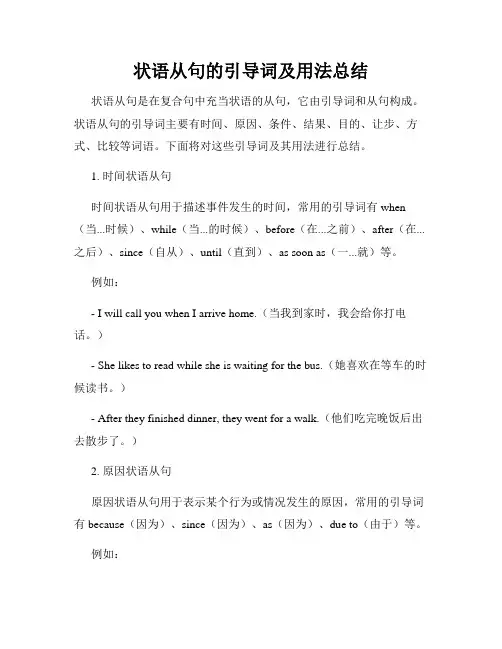
状语从句的引导词及用法总结状语从句是在复合句中充当状语的从句,它由引导词和从句构成。
状语从句的引导词主要有时间、原因、条件、结果、目的、让步、方式、比较等词语。
下面将对这些引导词及其用法进行总结。
1. 时间状语从句时间状语从句用于描述事件发生的时间,常用的引导词有when (当...时候)、while(当...的时候)、before(在...之前)、after(在...之后)、since(自从)、until(直到)、as soon as(一...就)等。
例如:- I will call you when I arrive home.(当我到家时,我会给你打电话。
)- She likes to read while she is waiting for the bus.(她喜欢在等车的时候读书。
)- After they finished dinner, they went for a walk.(他们吃完晚饭后出去散步了。
)2. 原因状语从句原因状语从句用于表示某个行为或情况发生的原因,常用的引导词有because(因为)、since(因为)、as(因为)、due to(由于)等。
例如:- She couldn't come to the party because she was sick.(她因为生病所以不能来参加派对。
)- He couldn't concentrate on his work since he was tired.(他因为累了无法集中精力工作。
)- As it was raining heavily, we decided to stay at home.(由于下着大雨,我们决定待在家里。
)3. 条件状语从句条件状语从句用于描述某种条件下的情况,常用的引导词有if(如果)、unless(除非)、as long as(只要)、provided/providing that(只要)、in case(万一)等。
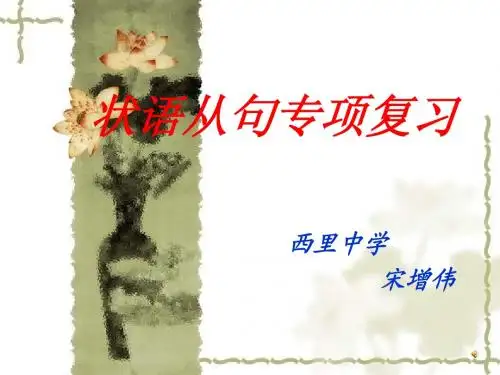

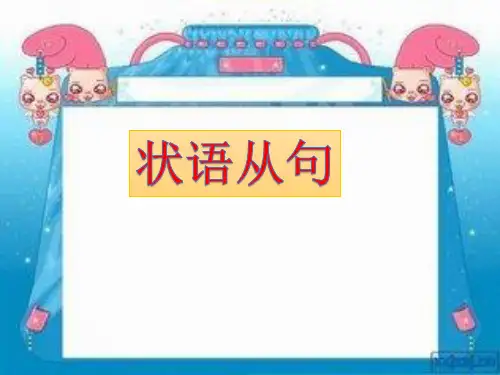
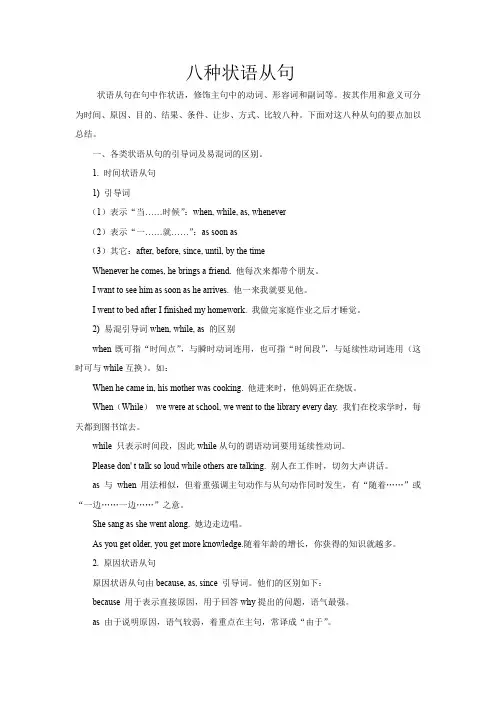
八种状语从句状语从句在句中作状语,修饰主句中的动词、形容词和副词等。
按其作用和意义可分为时间、原因、目的、结果、条件、让步、方式、比较八种。
下面对这八种从句的要点加以总结。
一、各类状语从句的引导词及易混词的区别。
1. 时间状语从句1) 引导词(1)表示“当……时候”:when, while, as, whenever(2)表示“一……就……”:as soon as(3)其它:after, before, since, until, by the timeWhenever he comes, he brings a friend. 他每次来都带个朋友。
I want to see him as soon as he arrives. 他一来我就要见他。
I went to bed after I finished my homework. 我做完家庭作业之后才睡觉。
2) 易混引导词when, while, as 的区别when既可指“时间点”,与瞬时动词连用,也可指“时间段”,与延续性动词连用(这时可与while互换)。
如:When he came in, his mother was cooking. 他进来时,他妈妈正在烧饭。
When(While)we were at school, we went to the library every day. 我们在校求学时,每天都到图书馆去。
while 只表示时间段,因此while从句的谓语动词要用延续性动词。
Please don' t talk so loud while others are talking. 别人在工作时,切勿大声讲话。
as 与when 用法相似,但着重强调主句动作与从句动作同时发生,有“随着……”或“一边……一边……”之意。
She sang as she went along. 她边走边唱。
As you get older, you get more knowledge.随着年龄的增长,你获得的知识就越多。
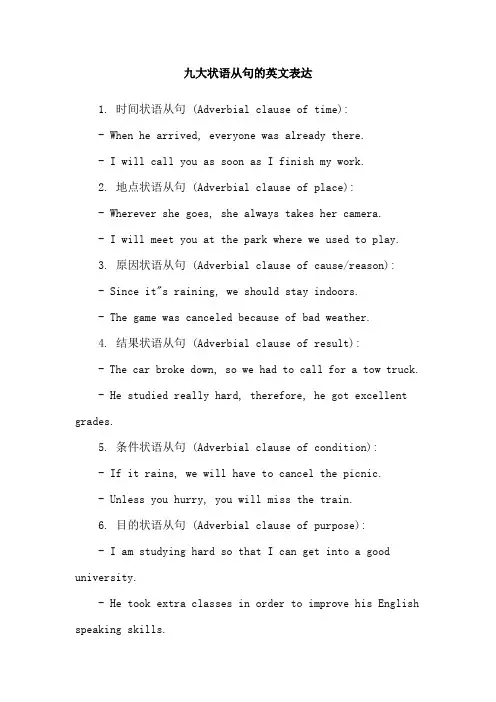
九大状语从句的英文表达1. 时间状语从句 (Adverbial clause of time):- When he arrived, everyone was already there.- I will call you as soon as I finish my work.2. 地点状语从句 (Adverbial clause of place):- Wherever she goes, she always takes her camera.- I will meet you at the park where we used to play.3. 原因状语从句 (Adverbial clause of cause/reason):- Since it"s raining, we should stay indoors.- The game was canceled because of bad weather.4. 结果状语从句 (Adverbial clause of result):- The car broke down, so we had to call for a tow truck. - He studied really hard, therefore, he got excellent grades.5. 条件状语从句 (Adverbial clause of condition):- If it rains, we will have to cancel the picnic.- Unless you hurry, you will miss the train.6. 目的状语从句 (Adverbial clause of purpose):- I am studying hard so that I can get into a good university.- He took extra classes in order to improve his English speaking skills.7. 方式状语从句 (Adverbial clause of manner):- She wrote the letter as if she was in a hurry.- They danced like nobody was watching.8. 比较状语从句 (Adverbial clause of comparison):- She is taller than I am.- He runs faster than his brother.9. 消息状语从句 (Adverbial clause of reported speech): - He told me that he would be late for the meeting.- She said that she was feeling tired.。
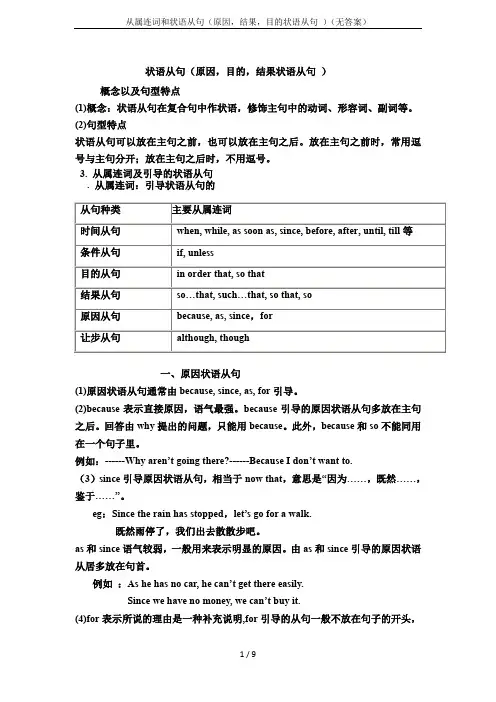
状语从句(原因,目的,结果状语从句)概念以及句型特点(1)概念:状语从句在复合句中作状语,修饰主句中的动词、形容词、副词等。
(2)句型特点状语从句可以放在主句之前,也可以放在主句之后。
放在主句之前时,常用逗号与主句分开;放在主句之后时,不用逗号。
3. 从属连词及引导的状语从句. 从属连词:引导状语从句的一、原因状语从句(1)原因状语从句通常由because, since, as, for引导。
(2)because表示直接原因,语气最强。
because引导的原因状语从句多放在主句之后。
回答由why提出的问题,只能用because。
此外,because和so不能同用在一个句子里。
例如:------Why aren’t going there?------Because I don’t want to.(3)since引导原因状语从句,相当于now that,意思是“因为……,既然……,鉴于……”。
eg:Since the rain has stopped,let’s go for a walk.既然雨停了,我们出去散散步吧。
as和since语气较弱,一般用来表示明显的原因。
由as和since引导的原因状语从居多放在句首。
例如:As he has no car, he can’t get there easily.Since we have no money, we can’t buy it.(4)for表示所说的理由是一种补充说明,for引导的从句一般不放在句子的开头,for引导的原因状语从句只能放于主句之后,并且必须用逗号将其与主句隔开。
:I decided to stop and have lunch, for I was feeling quite hungry.课堂随练用as,for ,sine,because填空1.I was late for class yesterday_____________ there was something wrongwith my bike.2.He took off his coat ___________ he felt hot.3.____________ you can’t answer the question, I’ll ask someone else.4._________he was ill, he didn’t go to school.5._______ you do not understand, I will explain again.6. ____she was late for class, she had to say sorry.7. He must be ill, _____he is absent today.8. I eat potatoes _________I like them.我吃土豆是因为我喜欢土豆。
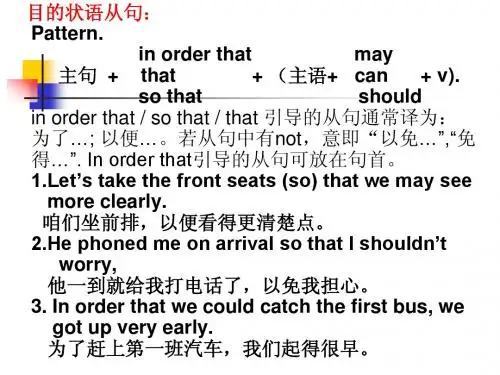
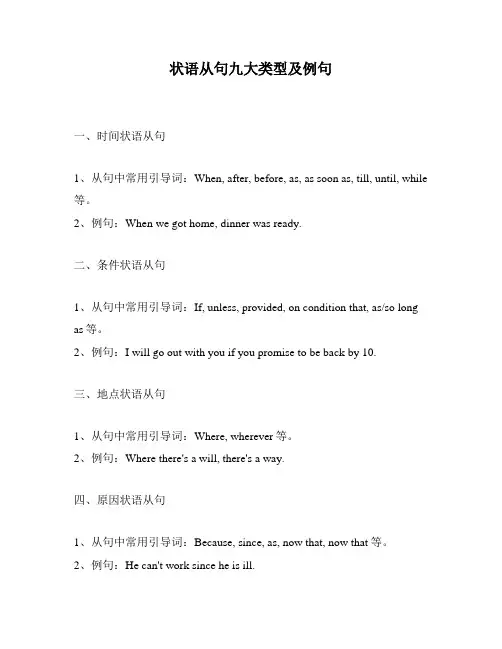
状语从句九大类型及例句一、时间状语从句1、从句中常用引导词:When, after, before, as, as soon as, till, until, while 等。
2、例句:When we got home, dinner was ready.二、条件状语从句1、从句中常用引导词:If, unless, provided, on condition that, as/so long as等。
2、例句:I will go out with you if you promise to be back by 10.三、地点状语从句1、从句中常用引导词:Where, wherever等。
2、例句:Where there's a will, there's a way.四、原因状语从句1、从句中常用引导词:Because, since, as, now that, now that等。
2、例句:He can't work since he is ill.五、结果状语从句1、从句中常用引导词:So that, so..that, such...that, that等。
2、例句:They worked so hard that they succeeded in the end.六、让步状语从句1、从句中常用引导词:Though, although, even though, whatever, whichever等。
2、例句:Though it rained heavily, the sports meeting went on.七、比较状语从句1、从句中常用引导词:Than, as, as...as, not so...as等。
2、例句:You ought to work harder than you do now.八、方式状语从句1、从句中常用引导词:As, as if, as though, like等。
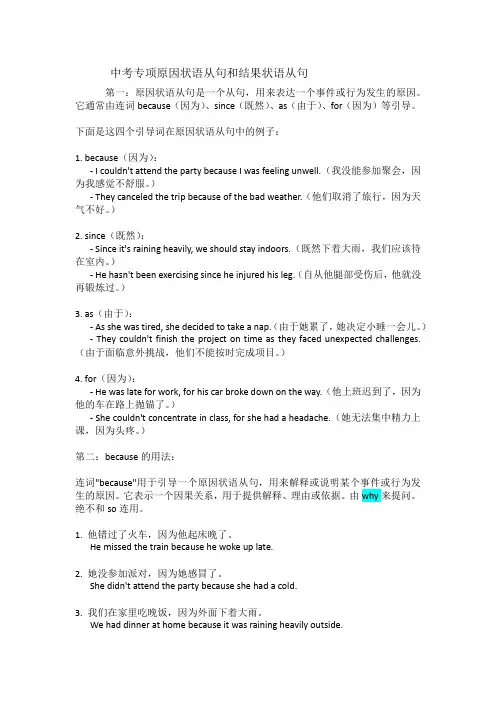
中考专项原因状语从句和结果状语从句第一:原因状语从句是一个从句,用来表达一个事件或行为发生的原因。
它通常由连词because(因为)、since(既然)、as(由于)、for(因为)等引导。
下面是这四个引导词在原因状语从句中的例子:1. because(因为):- I couldn't attend the party because I was feeling unwell.(我没能参加聚会,因为我感觉不舒服。
)- They canceled the trip because of the bad weather.(他们取消了旅行,因为天气不好。
)2. since(既然):- Since it's raining heavily, we should stay indoors.(既然下着大雨,我们应该待在室内。
)- He hasn't been exercising since he injured his leg.(自从他腿部受伤后,他就没再锻炼过。
)3. as(由于):- As she was tired, she decided to take a nap.(由于她累了,她决定小睡一会儿。
)- They couldn't finish the project on time as they faced unexpected challenges.(由于面临意外挑战,他们不能按时完成项目。
)4. for(因为):- He was late for work, for his car broke down on the way.(他上班迟到了,因为他的车在路上抛锚了。
)- She couldn't concentrate in class, for she had a headache.(她无法集中精力上课,因为头疼。
)第二:because的用法:连词"because"用于引导一个原因状语从句,用来解释或说明某个事件或行为发生的原因。
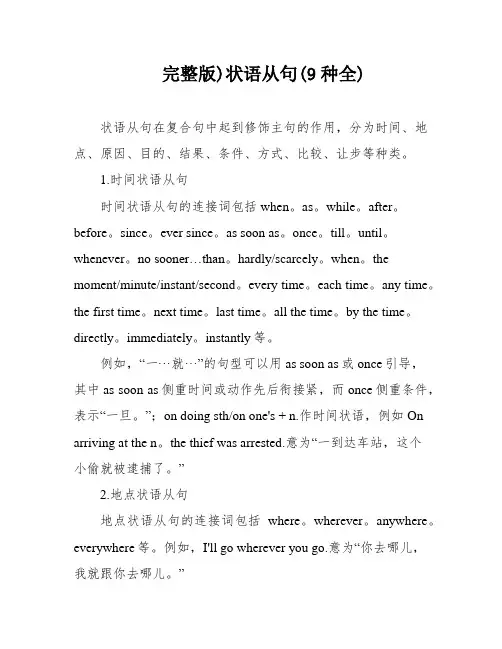
完整版)状语从句(9种全)状语从句在复合句中起到修饰主句的作用,分为时间、地点、原因、目的、结果、条件、方式、比较、让步等种类。
1.时间状语从句时间状语从句的连接词包括when。
as。
while。
after。
before。
since。
ever since。
as soon as。
once。
till。
until。
whenever。
no sooner…than。
hardly/scarcely。
when。
the moment/minute/instant/second。
every time。
each time。
any time。
the first time。
next time。
last time。
all the time。
by the time。
directly。
immediately。
instantly等。
例如,“一···就···”的句型可以用as soon as或once引导,其中as soon as侧重时间或动作先后衔接紧,而once侧重条件,表示“一旦。
”;on doing sth/on one's + n.作时间状语,例如On arriving at the n。
the thief was arrested.意为“一到达车站,这个小偷就被逮捕了。
”2.地点状语从句地点状语从句的连接词包括where。
wherever。
anywhere。
everywhere等。
例如,I'll go wherever you go.意为“你去哪儿,我就跟你去哪儿。
”3.原因状语从句原因状语从句的连接词包括because。
since。
as。
now that。
seeing that。
considering that等。
例如,Since it's raining。
we'll stay indoors.意为“因为下雨,我们将待在室内。
英语状语从句的九种类型状语从句是英语语法中一个非常重要的部分。
它可以用来修饰主句的动词,形容词,副词等,从而使句子更加完整,更加准确。
在状语从句中,最常见的就是状语从句。
状语从句可以分为九种类型,分别是时间状语从句,条件状语从句,原因状语从句,目的状语从句,结果状语从句,让步状语从句,方式状语从句,比较状语从句和地点状语从句。
下面我们将对这九种类型进行详细的介绍。
一、时间状语从句时间状语从句用来表示主句中所描述的动作发生的时间,包括过去、现在和将来。
时间状语从句通常由时间连词引导,如when、while、as soon as、before、after、since、until、till等等。
例如:I will call you as soon as I arrive in Beijing.(我到北京后会立即给你打电话。
)He had finished his homework before he went to bed.(他睡觉前已经完成了作业。
)二、条件状语从句条件状语从句用来表示主句中的动作发生的条件或假设。
条件状语从句通常由if、unless、provided that、in case等引导。
例如: If it rains tomorrow, we will stay at home.(如果明天下雨,我们会呆在家里。
)Unless you study hard, you won't pass the exam.(除非你努力学习,否则你不会通过考试。
)三、原因状语从句原因状语从句用来表示主句中的动作发生的原因。
原因状语从句通常由because、since等引导。
例如:He didn't come to the party because he was sick.(他因为生病没有来参加聚会。
)Since it's raining outside, we can't go for a walk.(因为外面下雨,我们不能去散步。
状语从句总结一、原因状语从句(1)原因状语从句通常由because, since, as, for引导。
(2)because表示直接原因,语气最强。
because引导的原因状语从句多放在主句之后。
回答由why提出的问题,只能用because。
此外,because和so不能同用在一个句子里。
例如:------Why aren’t going there?------Because I don’t want to.since引导原因状语从句,相当于now that,意思是“因为……,既然……,鉴于……”。
例如:Since the rain has stopped,let’s go for a walk. 既然雨停了,我们出去散散步吧。
as和since语气较弱,一般用来表示明显的原因。
由as和since引导的原因状语从居多放在句首。
例如:As he has no car, he can’t get there easily.Since we have no money, we can’t buy it.(3)for表示所说的理由是一种补充说明,for引导的从句一般不放在句子的开头。
如:I decided to stop and have lunch, for I was feeling quite hungry.练习:I was late for class yesterday _______ there was something wrongwith my bike.He took off his coat _______ he felt hot.you can’t answer the question, I’ll ask s omeone else.二、结果状语从句(1)结果状语从句由so…that, such…that, so that引导。
(2)so…that语such...that可以互换。
状语从句中的原因与目的关系状语从句是英语语法中重要的一部分,它承担着表达原因、目的、条件、结果等关系的作用。
其中,原因与目的关系是我们在日常交流和写作中经常用到的。
本文将探讨状语从句中的原因与目的关系。
一、状语从句中的原因关系原因关系是状语从句的一种常见类型。
原因状语从句表达事件或行为发生的原因。
以下是几个常用引导原因状语从句的连词:1. because:This party was canceled because it was raining heavily.(派对取消了,因为下大雨)2. since:She stayed home since she wasn't feeling well.(因为身体不舒服,她待在家里)3. as:He couldn't find his keys as he had left them in the office.(由于他把钥匙忘在办公室,他找不到了)4. due to:The flight was delayed due to bad weather.(由于恶劣天气,航班延误了)二、状语从句中的目的关系目的关系是状语从句的另一种常见类型。
目的状语从句表达出主要事件或行为的目的。
以下是几个常用引导目的状语从句的连词:1. so that:He studied hard so that he could pass the exam.(他努力学习,以便能通过考试)2. in order to:She wrote a note in order to remind herself of the meeting.(为了提醒自己参加会议,她写了一张便条)3. for the purpose of:They organized a fundraising event for the purpose of helping those in need.(他们组织筹款活动,目的是帮助有需要的人)4. to:He wakes up early every day to catch the first bus.(他每天早起为了赶上第一班公交车)总结:状语从句中的原因与目的关系对于准确表达语意非常重要。
初中英语语法专练—原因、结果和目的状语从句-全考点详解一、状语从句状语从句是指在整句中作状语时,起副词作用的句子。
它可以修饰谓语、非谓语动词、定语、状语或整个句子。
根据其作用可分为时间、地点、原因、条件、目的、结果、让步、方式和比较等从句。
状语从句一般由连词(从属连词)引导,也可以由词组引起。
二、原因状语从句如果从句表示的是主句行为的原因,就构成原因状语从句。
原因状语从句由表示原因的连词引导,常用的有because,since,as等。
1.because引导的原因状语从句,表示的往往是读者不了解的、不明显的原因,是全句叙述的重点,语气最强。
because引导的原因状语从句既可以放在主句之前,用逗号隔开,也可以放在主句之后。
如:He failed the exam because he was too careless.2.since引导的原因状语从句,表示显然的或已为人知的理由,常译为"因为;既然"。
如:Since everyone is here,let's start our meeting.3.as引导的原因状语从句,意为"因为;由于",其语气不如because 强,通常为附加说明的理由,且是已知晓的原因,主句与从句没有逻辑上的因果关系。
如:As she wasn't well, I went there alone.三、结果状语从句如果从句表示的是主句行为的结果,就构成结果状语从句。
结果状语从句由表示结果的连词引导,常用的有so,so...that...,such...that...等。
1.so引导的结果状语从句,表示"由于某个行为而导致的结果",只能放在主句之后。
如:He worked too hard, so he fell ill again.注意:because和so不能同时用在一个句子里。
如:Because it rained heavily, we stayed at home./It rained heavily, so we stayed at home.2.so...that...引导的结果状语从句,意为"太......以致于......",so后面接形容词或副词(看so前面的词来决定用形容词还是副词,如果是系动词就用形容词;如果是行为动词,就用副词。
9种状语从句标题:了解九种常见的状语从句状语从句是语法中的一种重要结构,用于描述或修饰主句中的动作、时间、原因、条件等。
下面将介绍九种常见的状语从句。
1.时间状语从句:当我们需要描述一个动作发生的时间时,可以使用时间状语从句。
例如,“我会在你回来之前完成作业。
”2.原因状语从句:原因状语从句用于解释主句中的原因或理由。
例如,“由于下雨,他没有去上学。
”3.条件状语从句:条件状语从句描述了主句中的动作发生的前提条件。
例如,“如果你明天来,我们可以一起去看电影。
”4.方式状语从句:当我们需要描述一个动作或事件的方式时,可以使用方式状语从句。
例如,“他唱歌的方式让人感动。
”5.地点状语从句:地点状语从句用于描述主句中的动作发生的地点。
例如,“我在哪儿等你,你就来哪儿。
”6.目的状语从句:目的状语从句解释了主句中的动作的目的或意图。
例如,“我去超市买东西,是为了准备晚餐。
”7.结果状语从句:结果状语从句用于描述主句中的动作的结果或后果。
例如,“他学习努力,所以考试取得了好成绩。
”8.让步状语从句:让步状语从句用于表达与主句中的动作相反的情况。
例如,“尽管下雨了,但他还是去跑步了。
”9.比较状语从句:比较状语从句用于进行比较。
例如,“她比我更聪明。
”以上是九种常见的状语从句,每一种都有不同的用法和功能。
在写作中,熟练掌握这些状语从句的用法,可以丰富句子的表达方式,使文章更加清晰和有逻辑。
总结一下,文章介绍了九种常见的状语从句,包括时间、原因、条件、方式、地点、目的、结果、让步和比较状语从句。
正确使用这些状语从句可以使文章更加流畅和表达更加准确。